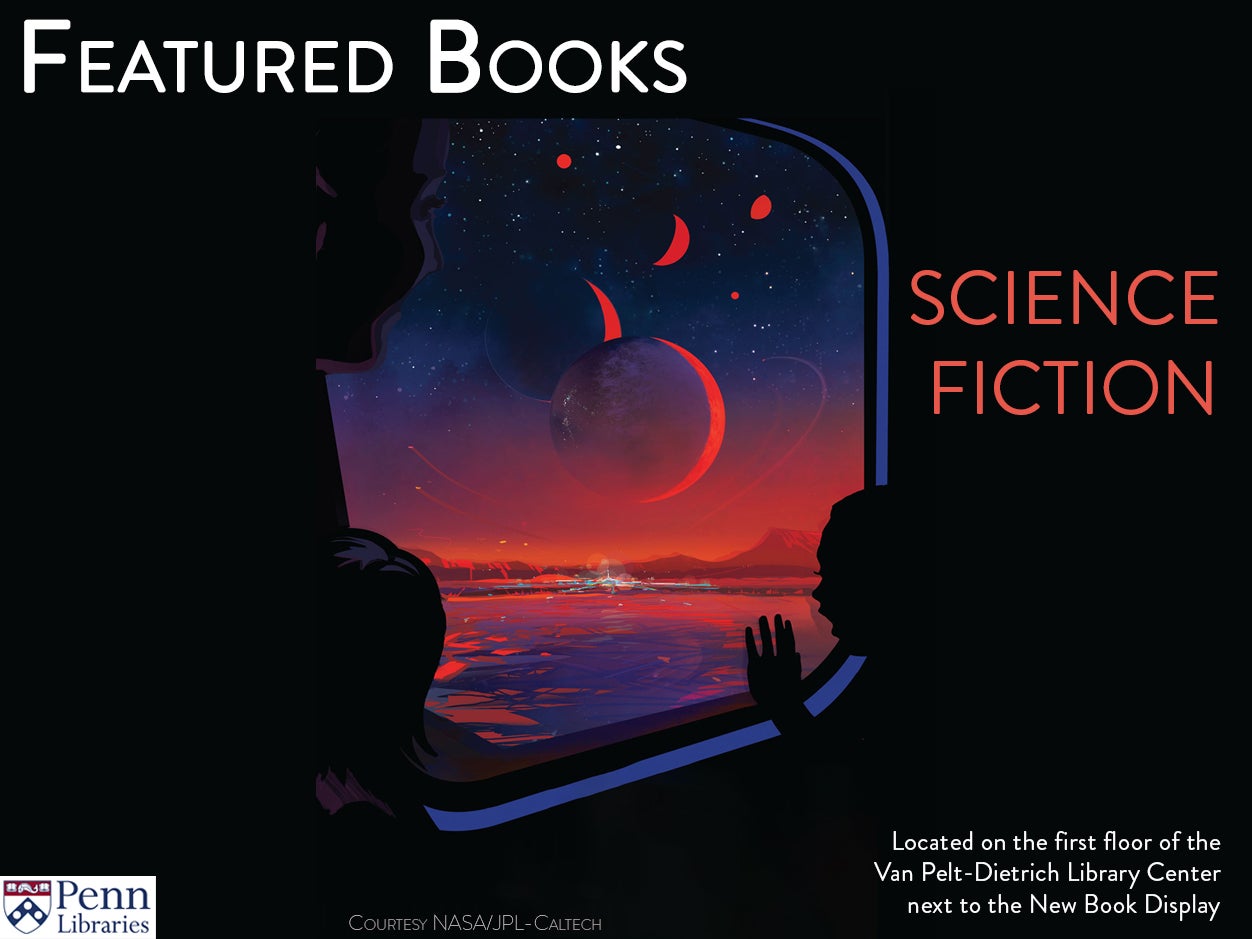Featured Books Display: Science Fiction

“Good science fiction, like noir fiction, plumbs the depths of the human condition,” says Eileen Kelly, Head of Collection Management. Together with Library Clerk Megan Brown, Kelly put together the most recent Featured Books display, a science fiction-themed smorgasboard of the Penn Libraries’ holdings. (Brown’s background in graphic design served her in creating the display’s signage, which incorporates one of the retro-style space travel posters released by NASA for free public download and use.)
Featured Books: Science Fiction highlights a number of sci-fi mainstays, including H.G. Wells’s infamous The War of the Worlds (1995; originally published 1897); when Orson Welles broadcast a dramatization of the novel in 1938, it allegedly incited panic among radio listeners who were unaware of the program’s fictional nature. The display also pays tribute to sci-fi doyenne Ursula K. Le Guin with the trilogy that marked her debut as a novelist, Worlds of Exile and Illusion (1996; originally published 1966).
Theodore Sturgeon — messenger of the revelation that “ninety percent of everything is crap” — has two featured titles, The Stars Are the Styx (1984) and the compilation American Science Fiction: Four Classic Novels, 1953-1956. Kelly included Sturgeon “for fans of Vonnegut,” whose character Kilgore Trout is a (thinly-veiled) fictionalized version of Sturgeon.
Kelly and Brown said that one of the biggest challenges they faced in curating this particular Featured Books display was the devotion of sci-fi enthusiasts, citing fans of Octavia Butler — the first science-fiction writer to receive a MacArthur Fellowship — as an example. “Her books are checked out again as soon as they’re checked in,” says Kelly. “But that worked to our advantage, since Featured Books is meant to showcase unexpected holdings.” The display therefore features one of Butler’s lesser-known novels, Adulthood Rites (1989).
What, exactly, makes a text sci-fi? By Darko Suvin’s popular definition, science fiction is a literary genre for which the “necessary and sufficient conditions are the presence and interaction of estrangement and cognition, and whose main formal device is an imaginative framework alternative to the author’s empirical environment.” In other words, science fiction is an uncanny recasting of reality, at once recognizable and alien; Kelly points to Thomas Disch’s The Wall of America (2008), a collection of short stories which “take place in the not-so-distant future in a quite recognizable America, populated by rather familiar Americans.”
Sci-fi scholarship typically examines the points of contact and disjunction between the real world and its literary mutations. Kelly notes how compelling such scholarship can be — which is why she and Brown went “heavy” on nonfiction for this display, including titles such as Terraforming: Ecopolitical Transformations and Environmentalism in Science Fiction (2016), The Battle of the Sexes in Science Fiction (2002), Medicine and Ethics in Black Women’s Speculative Fiction (2015), and Tomorrowland: Our Journey from Science Fiction to Science Fact (2015).
The timing of this Featured Books theme is fortuitous: Penn’s Diversity in the Stacks initiative recently premiered with a post on Afrofuturism, an artistic movement which “address[es] issues of blackness and race through speculative and science fiction.” This month’s Featured Books display spotlights Afrofuturistic holdings both literary — New Suns: Original Speculative Fiction by People of Color (2019) — and scholarly: Visions of the Third Millennium: Black Science Fiction Novelists Write the Future (2005); and Afro-Future Females: Black Writers Chart Science Fiction’s Newest New-Wave Trajectory (2008).
Featured Books: Science Fiction will be on display for six weeks and coincides with a Libraries science fiction writing workshop taking place on Tuesday, October 29. Check out Featured Books selection Read On — Science Fiction: Reading Lists for Every Taste, and contact Eileen Kelly for the full reading list or to propose themes for future exhibits.
Date
October 31, 2019
